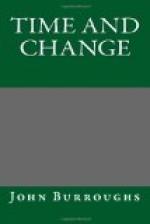IV
Biologists are coming more and more to recognize some unknown factor in evolution, probably some unknowable factor. The four factors of Osborn—heredity, ontogeny, environment, selection—play upon and modify endlessly the new form when it is started, but what about the original start? Whence comes this inborn momentum, this evolutionary send-off? What or who set the whole grand process going?
Bergson sees an internal psychological principle of development, hence the name of his book, “Creative Evolution.” Osborn uses the word “directed.” Certain characters, he says, are adaptive or suited to their purpose from the start; they do not have to be fitted to their place by natural selection. Huxley uses the word “predestined”—all the life of the globe and all the starry hosts of heaven are working out in boundless space and in endless time “their predestined course of evolution.” Darwin must have had in mind the same mysterious something when he said that man had risen to the very summit of the animal scale, but not through his own exertions. Not by his own will or exertion, surely, any more than the embryo in its mother’s womb develops into the full-grown child by its own exertion or than our temperaments and complexions and statures are matters of our own wills and choice. Something greater than man and before him, to which he sustains the relation that the unborn child sustains to its mother, must enter into our thought of his origin and development.
The great evolutionists have been very cautious about seeking to go behind evolution and name the Primal Cause. In such an attempt science would at once be beyond soundings. Darwin and Huxley were reverent, truth-loving men, but they hesitated as men of science to put themselves in a position where no step could be taken.




